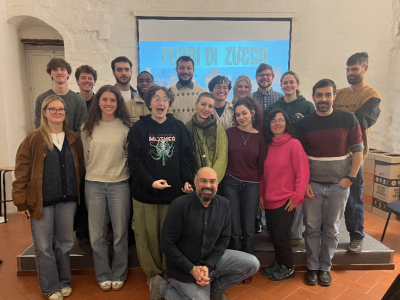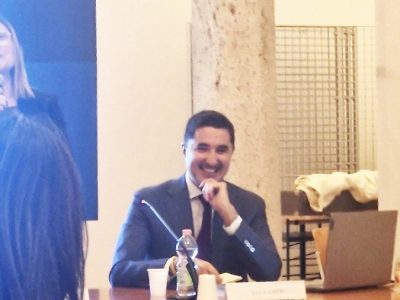Multi-Cultural Psychology

The Multicultural Psychology Program allows students to complete classes toward their degree, taught in English, as they study how culture influences our understanding of ourselves and others. In addition to their work in the classroom, students experience various experiential learning opportunities that offer insight into the role of cultural norms and values in shaping human behavior and interactions.
Rather than simply take place in the classroom, the Multi-cultural Psychology Program includes a series of workshops and site visits (attended by University of Perugia Psychology majors as well), along with a weekend Capstone Field Trip. Though the exact places students go on the trip varies semester-to-semester, in the past it’s included the former insane asylum (now a museum to the history of psychiatry), a horse therapy cooperative, and an avant-guarde center for early childhood education.
Why Study Psychology in Perugia?
This program is not limited to Psychology majors. Students of any major who study psychology at the Umbra Institute examine human development as influenced by similarities and differences between people and across cultures. Such a knowledge base is a useful tool when preparing for careers in counseling, education, research, social work, and many other professions. Through specific coursework, students can delve into organizational behavior and behavioral change, intercultural communication, critical disabilities, art therapy and numerous other topics, all from a multicultural perspective. In addition, by studying at the Umbra Institute, students have the opportunity to witness firsthand the interplay between different people and cultures as they explore Perugia, an international university city that offers a unique blend of cultural influences.
Not only do students study psychology, but they are also required to take an Italian language course (available from introductory to advanced levels). This language study provides further insight into the interplay between culture and identity, since even a basic understanding of Italian can help students begin to understand how linguistic expression influences how we think, behave, and interact with others.
Students may design their own semester and freely choosing courses from our offerings. Students interested in the MPP CERTIFICATE program must take core course PSYC 300 Experiencing Multicultural Psychology and at least three (3) additional courses in psychology or approved courses in related subjects.
Many students have received credit for their major for their MPP coursework. Contact the ISI Abroad office or the Director of The Umbra Institute, Zachary Nowak ([email protected]) for more information. For those students interested in possible graduate work: part of the program’s co-curricular offerings is an optional workshop “How To Get Into Grad School.”
Pyschology and Related Courses

PSYC/EDUC 300: Experiencing Multicultural Psychology (MPP Core Course)
Read More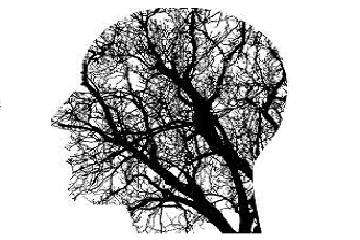
PSYC/SOC 249: Criminal Behavior
Read MoreART/PSYC 250: Art Therapy
Read More
PSYC 315 – Pathways to Wellness: Exploring Mental Health, Diagnosis, and Clinical Interventions (Psychopathology)
Read More
AI/BUS/PSYC 320: AI and Human Behavior in Organizations
Read More
EDUC/PSYC 325: Multicultural & Intercultural Education: The Psychology of Cross-Cultural Development
Read More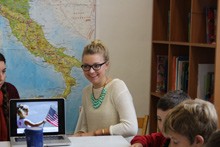
EDUC/PSYC 353: Education in Italy: Seminar and Practicum
Read More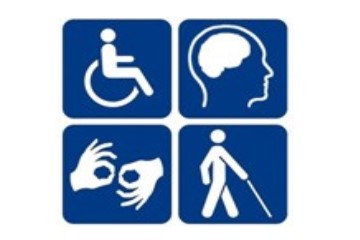
EDUC/PSYC 355: Critical Disabilities Studies – Seminar and Practicum
Read More
PSYC/SOC 360: Social Psychology – Observational Research in Italy
Read More
ANTH/FSST/SOC 375: Anthropology of Food and Eating: Understanding Self and Others
Read More
EDUC / PSYC / SOC 430: Human Development in Culture
Read MorePSYC 450: Positive Psychology – The Science of Behavioral Change
Read More
BUS / PSYC 460: Organizational Behavior: An Evidence-Based Approach
Read More
AI 305: It’s All in Your Head: The Cognition of Everyday Life
Read MoreWhat is Art Therapy?
Discover MoreResearch Opportunities

For students who are looking forward towards graduate school, the MPP offers two different possibilities for research. All students who take PSYC/SOC 360 Social Psychology–Observational Research in Italy design and carry out a small-scale project in Peugia using observational research. For students with advanced language abilities in Italian or a project that does not require Italian, there is also the Independent Research Course (IR 297/397/497). This is a student-centered learning experience in which students engage in advanced research on their selected topic with the support of a faculty mentor. It is ideal for students who have previously studied a particular topic and would like to continue exploring it in more depth through individual research. Interested students should first fill out the proposal form.
Co-Curricular Activities
PSYC 450: Positive Psychology
Qualitative Community Research Project
BUS/PSYC 460: Organizational Behavior
Service Learning Project with Local Company
Co-Curricular Activities
ART/PSYC 250: Art Therapy
Service Learning Project with Community Center
EDUC/PSYC 353: Education in Italy: Seminar and Practicum
Teaching practicums at local primary schools in Perugia
EDUC/PSYC 430: Human Development in Culture
Comparative Educational Systems Project: Italian,
Montessori, and American education systems.
Multicultural Psychology Program
- PSYC 300: Experiencing Multicultural Psychology (mandatory core course)
- Three (3) Courses in Psychology or Approved Related Subjects
- Italian Language Course (beginner to advanced available)
- Optional: An Elective from Umbra’s Course Offerings
The above curriculum allows students to complete 14 to 17 credits while abroad.
Each course includes various co-curricular activities that contribute to the student’s personal and academic growth, with some courses even offering limited field experience. These activities vary each semester but may include visiting the a former mental health institution, working with local schools to experience various educational systems, and engaging in community-based projects to better understand organizational behavior and change.
Students in the certificate program participate in additional activities embedded in the PSYC 300 core class, throughout the semester to further augment their learning. These activities typically include a welcome meeting with the program coordinator so that students can discuss their previous experiences with the study of psychology, learn more about the semester’s activities and talk about their expectations for the semester; a series of interactive workshops dedicated to a specific topic in psychology; a capstone field trip; and an end-of-semester reflective workshop where students can assess their experiences and explore career possibilities in conversation with professionals in the field.

